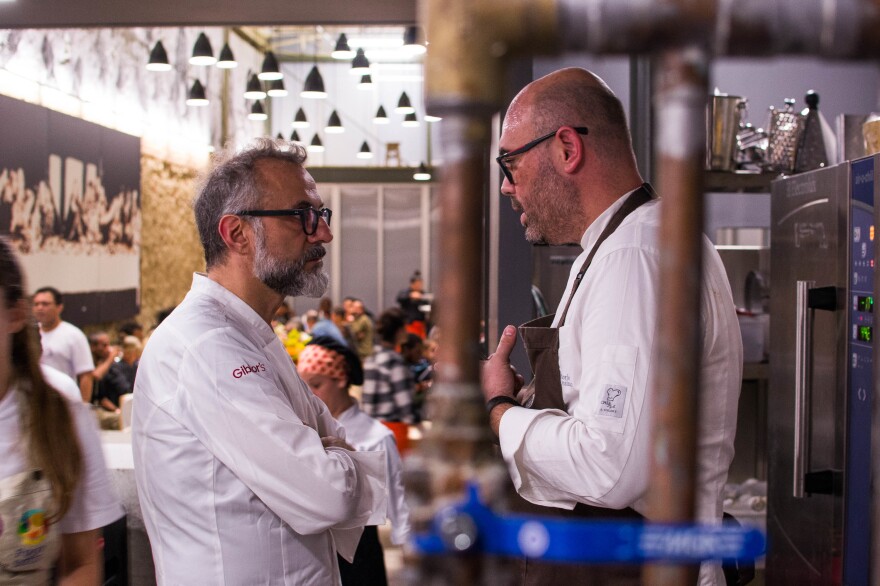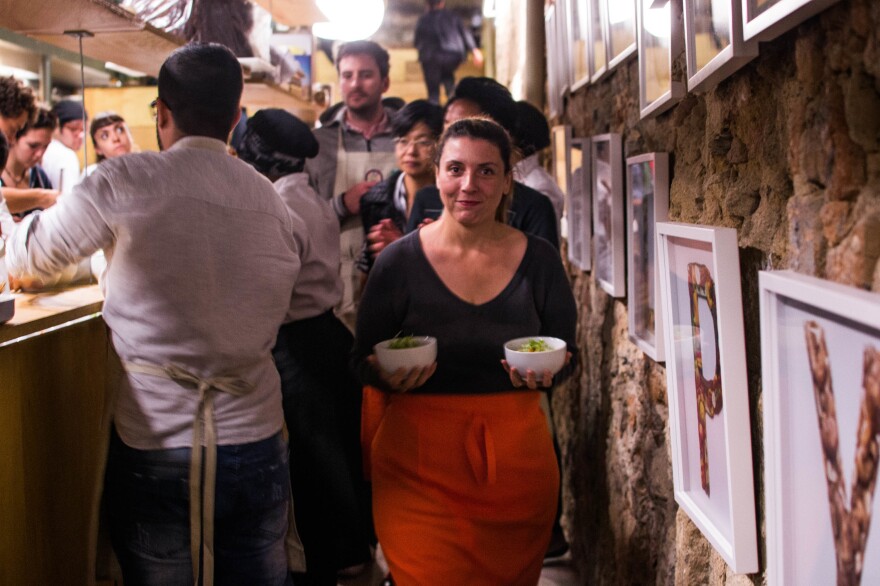It's a soup kitchen fit for kings and queens.
And that is exactly the way internationally famous chef Massimo Bottura wants it. The aim of this new venture, though, is different: It's a gourmet soup kitchen that uses leftovers to feed the less fortunate.
When you walk into Bottura's latest culinary temple, it would not be out of place in his home city of Modena, Italy, the location of his Michelin three-star restaurant Osteria Francescana.
"This is not a charity project, but a cultural one," Bottura says. "It's involving architects, artists, designer[s], to create a space full of beauty and culture."
Designers like Brazil's famed Campana brothers made the tables and chairs. São Paulo artist Vik Muniz — whose work has sold for hundreds of thousands of dollars — created a huge mural of a dripping chocolate Last Supper. It's a light and airy space that delights the senses in every way. Bottura says it was a deliberate effort.
"One of the most important things of this project is we give dignity, rebuild dignity," Bottura says. "It's not just about good food."
But of course, good food is a part of it. Every night a different world-famous chef takes the helm. Their challenge is to make a gourmet meal out of what has been donated.

"So we are going to get the overripe banana, the ugly mango or milk that was almost expired," he says. "And we show people what we can do with that — something amazing, something bright, something full of hope."
Everyone is helping out, especially the Olympic organizers.
"All the restaurants in Rio de Janeiro are donating food. Yesterday, a big truck came full of food from the Olympic venues, we didn't know what to do with it all," Bottura says, smiling. "We unloaded some of it, then we sent the rest to other communities."
The project is called RefettoRio Gastromotiva. It's an adaptation of something Bottura did in Milan, during Expo Milano 2015, where he took over an abandoned theater and transformed it into this unique kind of soup kitchen. Here in Rio, they again chose a derelict space, far away from the Olympic venues, in the neighborhood of Lapa.
"We are not in the Olympic village ... we are in a periphery. Where there is no spotlight," Bottura says.

Every night, the project serves only 70 people. The small group provides a special experience, as if you are in a fine dining establishment.
Rio is a city in which at least 25 percent of the population live in favelas, or impoverished communities. Bottura works with local charities to determine who gets a seat on a given night.
On the evening I was there, Venezuelan chef Carlos Garcia made the three-course dinner, and I helped serve it. In order to get access, I was told I had to take part and volunteer for the night. Bottura says it's a strict requirement.
"We don't want superficial people coming here to interview me because I'm the best chef in the world and I'm doing this," he says.

One other requirement is that we are not allowed to interview or photograph the guests in order to protect their identities, and make them feel they are in a safe space.
I donned my apron and the diners filed in. One was a child with his mother. Many were elderly, some had visible mental health issues, others were cross-dressers. These were people on the margins of society here. At first, you could tell they didn't know what to make of the experience.
But as the first course came out — a soup of beans and blanched vegetables — they began to smile and relax. Seated at long refectory-style tables, they interacted and joked. At the end of the meal, they broke out into applause.
Bottura hopes the project gets replicated in many other parts of the world. "Everything is possible," he says. "If you can dream you can make it." He says it's his Olympic hope.
Copyright 2021 NPR. To see more, visit https://www.npr.org. 9(MDAxNzg0MDExMDEyMTYyMjc1MDE3NGVmMw004))









